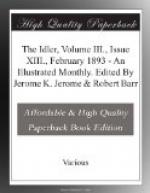* * * * *
[Sidenote: Frank Mathew displays his Ignorance.]
Ignorance—says some wiseacre—is the mother of eloquence, and I take it that the less one knows of Love the easier it is to write of it. I side with those who hold that the Love described by poets and other wordy people is mainly fanciful, a flattering picture, that the best school for such writing is an unhappy affection, and that no man can want better luck than to have his heart broken, and so be made proof against lovesickness. An unrequited love runs no risk of being dulled by the prose of life. A man so fortunate as to be jilted or rejected finds his Beloved remaining beautiful and young to him when her husband sees her an unwieldy and wearisome old woman. And when at times he grows sentimental—a bachelor’s privilege—he can feel again the old hopes that he never found false, and see the old perfections that were never disproved. He has a life-companion who comes only when she is wanted, and then with a “smile on her face and a rose in her hair,” whose voice is always gentle, to whom wrinkles are not necessary and bills are not known.
[Sidenote: And praises ugliness.]
I am one of those who prefer the luckless adorers in novels to the conquering heroes; and hold that the quality an ideal lover needs most is ugliness, so that he may honour beauty the more. Once I knew a boy who was uglier than sin, and who wrote a story—in a sprawling hand and on ruled paper—a wonderful story, telling how an unlovely but admirable Knight, worshipping a Princess, rode out to win her by great deeds, and how when he came back triumphant, the sight of her brought his unworthiness home to him so that he dared not claim her. And I knew another boy who was good-looking, and wrote a story (during study-time, of course, and by stealth) about a handsome hero who went to Court in fine clothes, and was worshipped by all the girls. I think now that he was the manlier, but that the first would have made the more devout lover. But the drawback of luckless adorers is that their constancy has not been tried by the ordeal of success. Many a fellow who lived loyal and heart-broken would have made an unfaithful husband.
* * * * *
[Sidenote: ‘Q.’ is surprised at his sister.]




